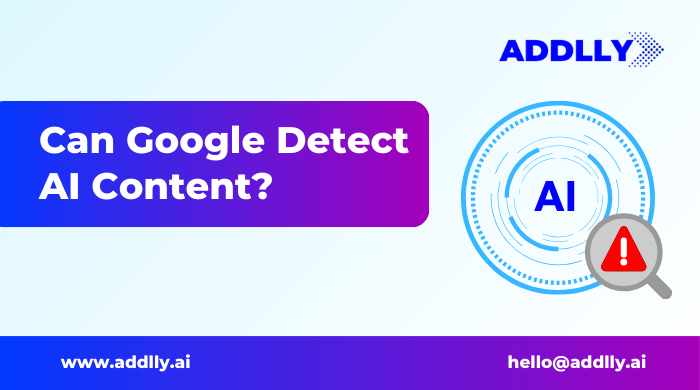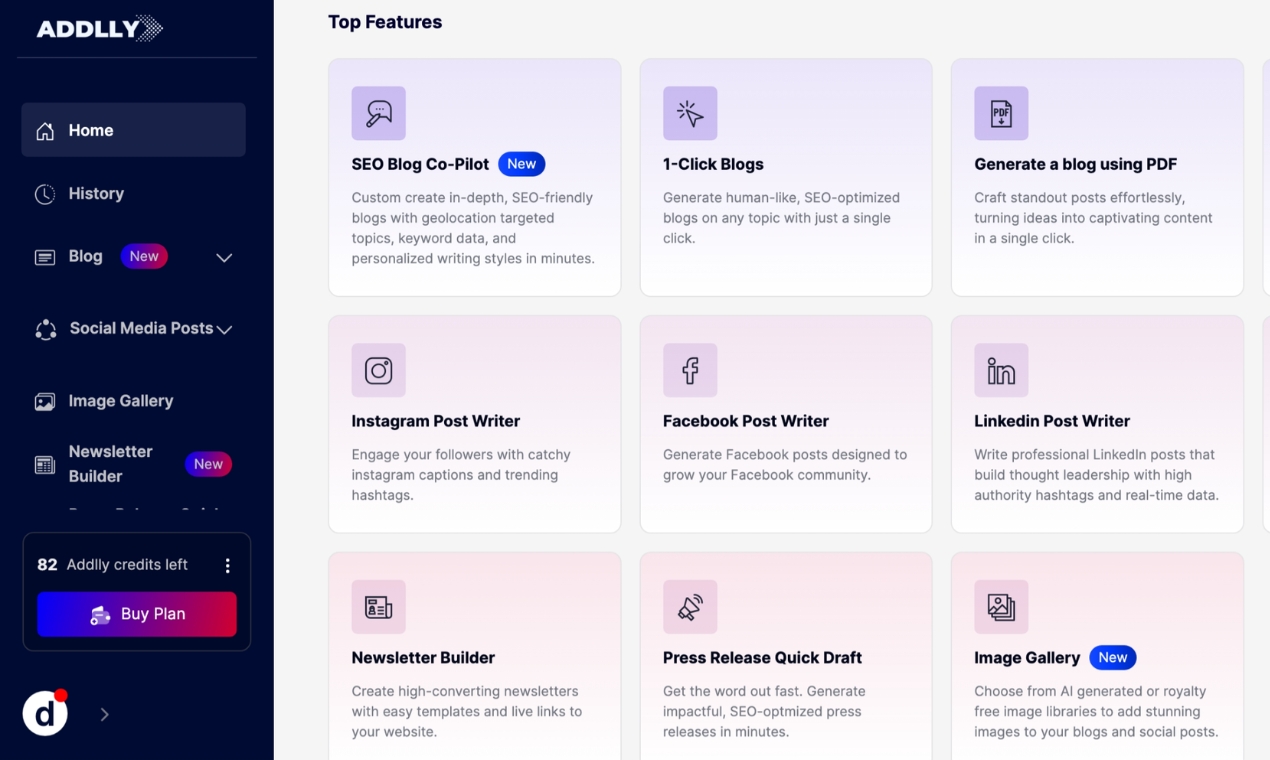In the fast-changing world of the internet, a new trend is taking over: AI-generated content. But with this new technology comes a big question: Can Google tell if content is made by AI? And if it can, what does that mean for the future of SEO?
This article explores how Google detects AI content, what it means for SEO, and how to make sure your content stays effective and ranks well.
Key Takeaways
- Google has invested heavily in developing systems to identify machine-generated content.
- Factual inaccuracies and lack of contextual understanding are telltale signs of AI content.
- Over-optimization and awkward phrasing can trigger Google’s AI detection.
Quick Summary Powered by Addlly AI
ToggleUnderstanding AI-Generated Content
AI-generated content refers to text, images, videos, and other forms of media created by artificial intelligence algorithms. These algorithms, often powered by machine learning and natural language processing (NLP), can produce human-like content with remarkable accuracy.
Tools like OpenAI’s GPT-4 have revolutionized content creation, enabling users to generate articles, blog posts, social media updates, and more with minimal human intervention.
For more insights on leveraging AI for SEO, check out How to Use AI for SEO.
Evolution of Google’s Algorithms
In recent years, Google introduced significant updates to its search algorithms, marking a pivotal moment in the evolution of its search technology.
One of the most notable updates was the March 2024 Core Algorithm Update, which aimed to enhance the quality of search results by identifying helpful content and reducing the prominence of content created primarily for search engines.
This update involved changes across multiple core systems, indicating Google’s commitment to refining its algorithms to better serve users’ needs.
To understand the broader implications of AI-generated content, read Is AI-Generated Content Good for SEO?.
How Does Google Detect AI Content
Google’s algorithms can identify AI-generated content by analyzing various factors, including:
- Repetitive Patterns: AI-generated content may exhibit repetitive phrases or structures that are less common in human-written text.
- Lack of Contextual Understanding: While AI can generate coherent text, it may struggle with nuanced understanding and context, leading to content that feels off-topic or disjointed.
- Over-Optimization: AI tools often produce content that is overly optimized for SEO, with keyword stuffing and unnatural phrasing.
- Uniformity in Style: AI-generated content may lack the stylistic diversity found in human writing, resulting in a uniform tone and structure.
Google’s Official Stance on AI-Generated Content
Google’s stance on AI-generated content makes it clear that while they recognize such content, it doesn’t automatically lead to penalties in terms of search rankings.
As long as the content is created with genuine user interest in mind and maintains high quality, there’s potential for it to perform well in search results. Google focuses on the intent and usefulness of the content rather than the method of its creation.
Therefore, it’s possible to achieve good rankings with AI-generated content, provided it adheres to Google’s guidelines regarding quality and user experience.
If you’re looking to improve your search rankings, explore How to Rank Higher on Google.
Strategies for Effective AI Content Creation
Human-AI Collaboration
One of the most effective ways to use AI in content creation is through human-AI collaboration. While AI can generate drafts and provide inspiration, human writers can refine and enhance the content, adding a personal touch and ensuring it meets quality standards. This hybrid approach combines the efficiency of AI with the creativity and insight of human writers.
To dive deeper into the future of SEO, consider learning about Generative Engine Optimization (GEO).
Focus on User Experience
Google’s algorithms prioritize content that provides a positive user experience. This means creating content that is easy to read, visually appealing, and informative. Marketers should focus on:
- Readability: Use clear and concise language, short paragraphs, and bullet points to enhance readability.
- Visuals: Incorporate images, videos, and infographics to break up text and make the content more engaging.
- Relevance: Ensure the content addresses the needs and interests of the target audience.
Regular Updates and Audits
Content that remains static can quickly become outdated and lose its relevance. Marketers should regularly update their content to reflect the latest trends, information, and best practices. Conducting content audits can help identify areas for improvement and ensure that all content aligns with current SEO standards.
Ethical SEO Practices
While AI tools can optimize content for search engines, it’s essential to avoid over-optimization. Ethical SEO practices include:
- Natural Keyword Integration: Use keywords naturally within the content, avoiding keyword stuffing.
- Diverse Backlinking: Build a diverse and high-quality backlink profile to enhance credibility and authority.
- User-Centric Content: Prioritize content that provides value to the user, rather than focusing solely on search engine rankings
Addlly AI: The Best Tool for Creating AI Content
Addlly AI stands out as a state-of-the-art tool for generating content, leveraging sophisticated natural language processing (NLP) algorithms to produce top-notch content.
This makes it an excellent option for content creators and social media managers aiming to craft engaging long-form blog articles, short pieces, social media updates, and persuasive marketing materials.
Addlly AI ensures that the content it produces aligns with Google’s standards, addressing concerns about detection and improving the chances of achieving favorable search rankings.
Key features of Addlly AI:
- 1-Click Blog Writer and SEO Blog Co-Pilot: Whether you wish to do a quick blog post or create a more in-depth article with credible sources, all you need to do is provide your topic, keyword and target audience geo-location. Addlly will handle the rest.
- Holistic SEO Workflow: With Addlly AI’s unique capability to offer content outline recommendations, content creators can strategically structure their blog posts, ensuring the seamless integration of relevant headings, captivating subheadings, and key points that align with SEO best practices.
- AI Image Generation: The tool includes a built-in feature for creating unique, high quality AI images to accompany your text, be it blogs or social copy.
- Digital ads: Addlly AI also streamlines the creation and testing of ad copies. It can generate competitive and engaging ad copies that drive conversions, in just a single click.
- Newsletter Writer: Craft compelling newsletters effortlessly with Addlly AI. This feature helps you design newsletters that are informative, engaging, and tailored to your audience, enhancing your communication strategy.
- Press Release Quick Draft: Produce professional press releases that capture attention and effectively convey your message. Addlly AI ensures your press releases are well-structured, clear, and impactful.
Addlly AI also ensures your content is SEO-friendly, fact-checked, and free from hallucinations, making it a superior AI writing tool.
For more tools and tips on creating effective SEO content, check out Content Writing Tools for SEO.
Conclusion
In conclusion, Google can detect AI-generated content, but this detection does not inherently penalize content in search rankings. The key to success lies in creating high-quality, user-centric content that provides real value to the audience. By leveraging AI tools responsibly and focusing on ethical content creation practices, marketers can harness the power of AI while maintaining their competitive edge in the digital landscape.
As AI technology continues to evolve, staying informed about the latest developments and adapting strategies accordingly will be crucial. By embracing a collaborative approach and prioritizing user experience, marketers can ensure their content remains effective, engaging, and well-ranked in Google’s search results.
Author
-
As the Content Marketing Specialist at Addlly.ai, I specialize in writing compelling articles and creating visually engaging designs and videos for our marketing materials. My role encompasses developing informative and captivating content that resonates with our audience, alongside designing dynamic visuals that enhance our brand's message.
View all posts




